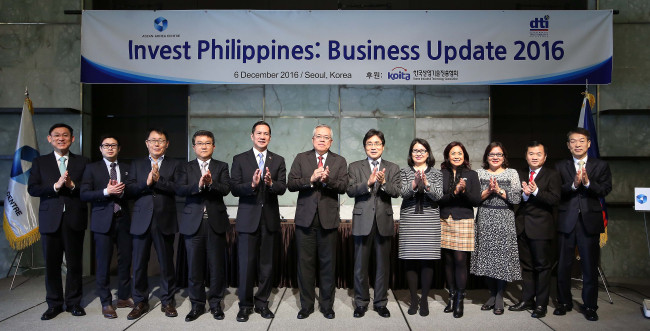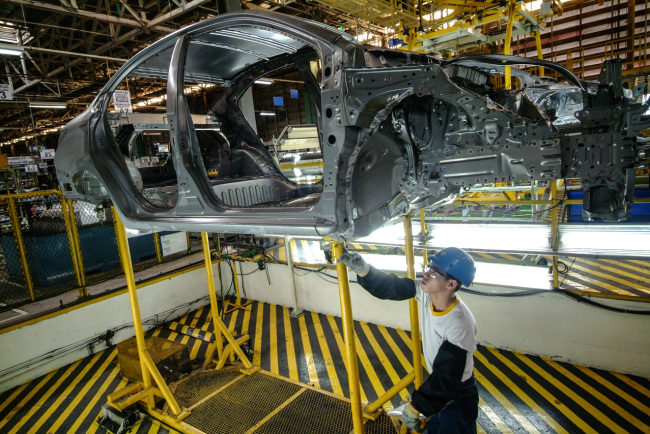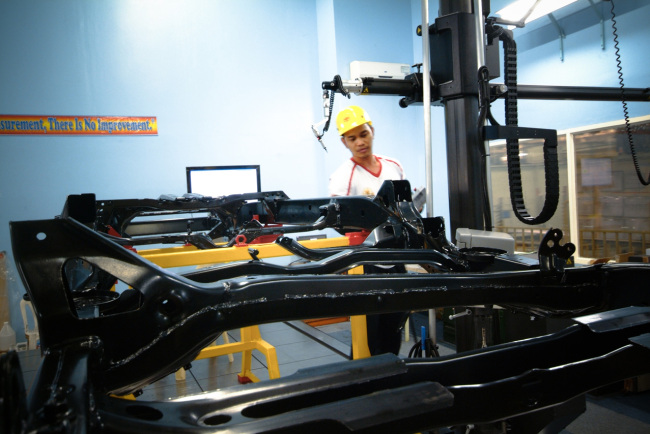‘Philippines offers stable, secure investment environ’
By Korea HeraldPublished : Dec. 13, 2016 - 00:08
In part energized by Philippine President Rodrigo Duterte’s nationwide crackdown on crime and corruption, the Philippines’ business climate has become more stable and secure, according to its commercial bureaus.
Duterte’s administration has laid out its 10-point socio-economic agenda aimed at shoring up macroeconomic conditions, international competitiveness, integration into regional and global value chains, rural development, human capital and innovative capacity.
The Philippine economy grew at around 7 percent this year, the second highest in Asia, trailing India at 7.1 percent. Over $4 billion of foreign investment poured into the country in the first half of the year.
The government has implemented the Comprehensive Automotive Resurgence Strategy program to vitalize its automotive industry. The country is one of the fastest growing markets for car sales in the world, recording a 23 percent increase last year.

To further elicit Korean business, a delegation of Filipino government officials came to Korea last week. They attended an investment seminar in Seoul on Dec. 6, organized by the center and the Philippine Department of Trade and Industry and sponsored by Korea Industrial Technology Association.
“The Philippines is a blue ocean of opportunities,” said ASEAN-Korea Center Secretary-General Kim Young-sun at the venue, which attracted Korean companies in vehicle parts, electronics, food processing and manufacturing.
“The President Duterte administration’s strong commitment to improving the ease of doing business in his country and firm stance on safety and security will allow a more favorable environment for foreign investment,” he added.
Noting that Duterte’s tough approach to fighting corruption as mayor in city Davao was credited for enhancing the rule of law, social stability and economic vitality, Kim said the Korean government recently inaugurated an honorary consulate in Davao in recognition of its growth potential.

Two-way trade topped $7 billion last year, and Korean investment surpassed $500 million during the same period, covering manufacturing, accommodation and food services, and electricity, gas, steam and air conditioning supply.
Last year, 1.3 million Koreans visited the Philippines, including popular tourism destinations Cebu, Boracay and Palawan. Some 400,000 Filipinos came to Korea during the same period, where 53,000 Filipinos live, and around 89,000 Koreans are residing in the tropical country.
“Many economies worldwide are facing uncertainty and contraction, but the Philippines continues to be a bright spot in Asia,” said Philippine Ambassador to Korea Raul S. Hernandez. “Anyone who has visited the country lately will notice that dynamism, optimism and vigor are in the air. You see it in the many retail stores, construction cranes and even in our infamous traffic jam, a testament to booming car sales.”
Ramon Lopez, secretary of the Philippine Department of Trade and Industry, said the top five priority sectors of the Comprehensive National Industrial Strategy are auto manufacturing, infrastructure and logistics, tourism, business process outsourcing and agri-business.

Other lucrative sectors for Korean investors are shipbuilding, energy, food production and processing, electronics, finance and banking and labor-intensive industries moving out of China, Lopez highlighted.
The Manufacturing Resurgence Program aims to deepen integration into regional and global production network, he noted, vying to make the country a hub in auto, electronics, machinery, garment and food industries. The program also supports micro, small and medium-sized enterprises, which account for 99.6 percent of established businesses and employ 65 percent of the total workforce.
The Philippines has 348 economic zones and industrial park areas for manufacturing, information technology business, agri-industry, eco-tourism and medical tourism. Various public-private partnerships have fleshed out infrastructure projects across the archipelago nation.
Part of the Association of Southeast Asian Nations Economic Community that was launched last year, the country has signed seven free trade agreements with the European Union, the European Free Trade Association states of Iceland, Liechtenstein, Norway and Switzerland, as well as Chile, Mexico, Peru, India, Australia and New Zealand.
By Joel Lee (joel@heraldcorp.com)
-
Articles by Korea Herald








![[Graphic News] More Koreans say they plan long-distance trips this year](http://res.heraldm.com/phpwas/restmb_idxmake.php?idx=644&simg=/content/image/2024/04/17/20240417050828_0.gif&u=)
![[KH Explains] Hyundai's full hybrid edge to pay off amid slow transition to pure EVs](http://res.heraldm.com/phpwas/restmb_idxmake.php?idx=644&simg=/content/image/2024/04/18/20240418050645_0.jpg&u=20240419100350)






![[From the Scene] Monks, Buddhists hail return of remains of Buddhas](http://res.heraldm.com/phpwas/restmb_idxmake.php?idx=652&simg=/content/image/2024/04/19/20240419050617_0.jpg&u=20240419175937)

![[KH Explains] Hyundai's full hybrid edge to pay off amid slow transition to pure EVs](http://res.heraldm.com/phpwas/restmb_idxmake.php?idx=652&simg=/content/image/2024/04/18/20240418050645_0.jpg&u=20240419100350)

![[Today’s K-pop] Illit drops debut single remix](http://res.heraldm.com/phpwas/restmb_idxmake.php?idx=642&simg=/content/image/2024/04/19/20240419050612_0.jpg&u=)